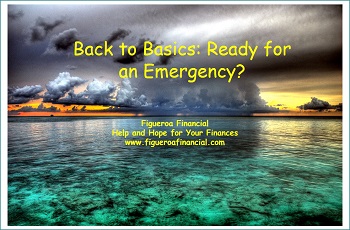 Note: This week I am concluding my “back to basics” series.
Note: This week I am concluding my “back to basics” series.
Over the past few weeks I have talked about regaining control of your money by living on a budget, keeping track of your money, and learning to pay yourself first.
Today I am finalizing the series by taking a look at why we need to have an emergency fund.
Ready for the Storm?
Growing up on a tropical island, living through tropical storms and hurricanes was part of my way of life. As a matter of fact I distinctly remember hurricane Eloise rudely intruding on my 8th birthday in 1975.
In Puerto Rico we always knew the drill: Between June 1st and November 30th we just had to be ready for the potential of lots of rain, loss of power, and interruption to the water service.
This meant we had to stock on non-perishable food items, drinking water, batteries for the radio (to keep up with the news) and flashlights and candles. It also meant making sure you had enough gas in the cars.
The drill did not change every year because we knew the possibility was very real that we would be hit with a storm. However, it also never failed that people failed to prepare.
It was always entertaining (and a little sad) to see the news reports on TV about people rushing to the super market to stock on provisions the day before the storm was scheduled to arrive or in some cases on the day the storm was scheduled to hit.
You would see the anger and desperation of the people. I usually thought: Don’t you know where you live? Have you not been watching the news?
Why is this a surprise and why did you wait until now?
The Application to Your Money: Be Ready for an Emergency
When it comes to your finances, we can become guilty of the same lack of readiness. We know life happens and we will run into some difficulties.
I am not trying to be pessimistic but realistic. Emergency situations will happen to all of us. So the question is: are you ready for an emergency?
A 2011 survey by the National Foundation for Credit Counseling (NFCC) reveals that 64% of Americans don’t have $1,000 in savings to cover an emergency situation.
And in spite of some improvement of the last couple of years, American’s savings rate still lags considerably compared to other nations.
We are saving more than a couple of years ago (around 4.1%), but not nearly enough. So what to do about it?
First let’s define what an “emergency” situation is with regard to your finances. This would be an unexpected expense outside of your monthly budget.
Some examples include:
- Major Car Repairs
- Home Repairs
- Appliance Replacement
- Uncovered Medical Expense
So how much money do you need in your emergency fund? Here is what I would recommend:
- Beginner’s emergency fund: $1,000
- $500 if annual household income is less than $20K.
- Do this, before you start paying down on your consumer debt.
- Most typical “emergencies” can be handled with a beginner’s fund.
- Full emergency fund: 3 to 6 months of monthly expenses (based on your monthly budget).
- Do this, after you pay off your consumer debt.
Decide today that you will be ready before the storm hits.
So What?
Having an emergency fund, even a beginner’s emergency fund, will help you in a couple of ways.
First, it would keep you from going further into debt. You would not have to borrow money to cover the expense.
Second, it would help you stay within your monthly budget. You would not have to make a decision on which expense to cut this month.
Finally, and as a result of the first two, you would have peace of mind. The Bible says that a man who saves is a wise man (Proverbs 21:20).
So do what you must do today to complete your emergency fund. You might need to work extra, you might need to cut back on some fun items.
But make sure you are ready for an emergency before it happens.
“he who spends more than he earns is sowing the winds of needless self-indulgence from which he is sure to reap the whirlwinds of trouble and humiliation.”
From the “The Richest Man in Babylon” by George S. Clason
Question: Could you deal with an emergency today without going into debt?
This post is also available in: Spanish

Thanks for the reminder again Jose, thanks for re-introducing me to financial concepts that have made for a more peaceful existence in the last couple of years.
Pingback: Financial Literacy Month: The Savings Series – Help and Hope for Your Finances / Ayuda y Esperanza para Tus Finanzas
Pingback: What if I lose My Job? – Help and Hope for Your Finances / Ayuda y Esperanza para Tus Finanzas
Pingback: Ready To Buy a House? 3 Questions To Ask Yourself. - Figueroa FinancialHelp and Hope for Your Finances - Christian Financial Coaching
Pingback: The Budget Is The Key - Figueroa FinancialHelp and Hope for Your Finances - Christian Financial Coaching